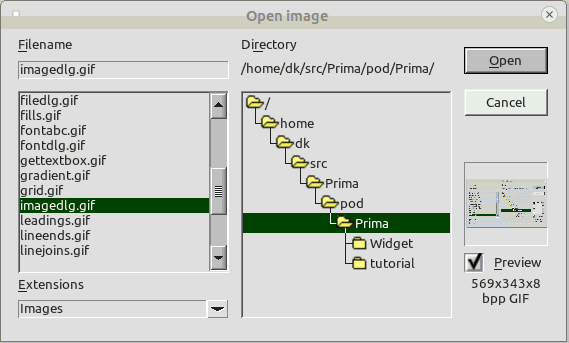NAME
Prima::Dialog::ImageDialog - file open and save dialogs.
DESCRIPTION
The module provides dialogs specially adjusted for image loading and saving.
Prima::Dialog::ImageOpenDialog
Provides a preview feature, allowing the user to view the image file before loading, and the selection of a frame index for the multi-framed image files. Instead of execute call, the load method is used to invoke the dialog and returns the loaded image as a Prima::Image object. The loaded object by default contains {extras} hash variable set, which contains extra information returned by the loader. See Prima::image-load for more information.
SYNOPSIS
use Prima qw(Application Dialog::ImageDialog);
my $dlg = Prima::Dialog::ImageOpenDialog-> new;
my $img = $dlg-> load;
return unless $img;
print "$_:$img->{extras}->{$_}\n" for sort keys %{$img-> {extras}};
Proprties
- preview BOOLEAN
-
Selects if the preview functionality is active. The user can switch it on and off interactively.
Default value: 1
Methods
- load %PROFILE
-
Executes the dialog, and, if successful, loads the image file and frame selected by the user. Returns the loaded image as a
Prima::Imageobject. PROFILE is a hash, passed toPrima::Image::loadmethod. In particular, it can be used to disable the default loading of extra information in{extras}variable, or to specify a non-default loading option. For example,{extras}->{className} = 'Prima::Icon'would return the loaded image as an icon object. See Prima::image-load for more.loadcan report progressive image loading to the caller, and/or to an instance ofPrima::ImageViewer, if desired. If either (or both)onHeaderReadyandonDataReadynotifications are specified, these are called from the respective event handlers of the image being loaded ( see "Loading with progress indicator" in Prima::image-load for details). If profile keyprogressVieweris supplied, its value is treated as aPrima::ImageViewerinstance, and it is used to display image loading progress. See "watch_load_progress" in Prima::ImageViewer.
Events
Prima::Dialog::ImageSaveDialog
Provides a save dialog where the user can select image format, the bit depth and other format-specific options. The format-specific options can be set if a dialog for the file format is provided. The standard toolkit dialogs reside under in Prima::Image namespace, in Prima/Image subdirectory. For example, Prima::Image::gif provides the selection of transparency color, and Prima::Image::jpeg the image quality control. If the image passed to the image property contains {extras} variable, the data are read and used as the default values. In particular, {extras}->-{codecID} field, responsible for the file format, if present, affects the default file format selection.
SYNOPSIS
my $dlg = Prima::Dialog::ImageSaveDialog-> create;
return unless $dlg-> save( $image );
print "saved as ", $dlg-> fileName, "\n";Properties
- image IMAGE
-
Selects the image to be saved. This property is to be used for the standard invocation of dialog, via
execute. It is not needed when the execution and saving is invoked via save method.
Methods
- save IMAGE, %PROFILE
-
Invokes the dialog, and, if the execution was successful, saves the IMAGE according to the user selection and PROFILE hash. PROFILE is not used for the default options, but is passed directly to
Prima::Image::savecall, possibly overriding selection of the user. Returns 1 in case of success, 0 in case of error. If the error occurs, the user is notified before the method returns.
AUTHOR
Dmitry Karasik, <dmitry@karasik.eu.org>.
SEE ALSO
Prima, Prima::Window, Prima::codecs, Prima::image-load, Prima::Image, Prima::Dialog::FileDialog, Prima::ImageViewer, examples/iv.pl.